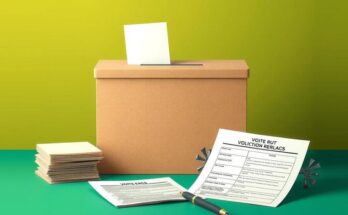The German government has accused Elon Musk of trying to influence its February elections by endorsing the far-right AfD party. Musk’s involvement has drawn sharp criticism from political leaders, who compare his actions to foreign attempts to meddle in elections. The situation raises concerns over foreign influence in domestic politics as the AfD gains ground ahead of the elections.
The German government has publicly accused Elon Musk, the billionaire entrepreneur and owner of X, of attempting to influence the upcoming parliamentary elections in Germany scheduled for February 23. This accusation stems from Musk’s endorsement of the far-right Alternative for Germany (AfD) party in an opinion piece published in the Welt am Sonntag, which was met with significant backlash, resulting in the resignation of the commentary editor in protest. According to a government spokesperson, Musk’s public statements and social media posts are indeed efforts to sway the electoral outcome, despite being referred to as “nonsense.”
While Musk asserts his right to express his views on German politics due to his substantial investments in the country, he has faced sharp criticism from various political figures. The government spokesperson acknowledged Musk’s freedom of expression but noted that his endorsement of the AfD—a party under scrutiny for alleged extremist tendencies—compromises the democratic process. German leaders, including members of Chancellor Olaf Scholz’s Social Democrats, have condemned Musk’s involvement, drawing parallels between his actions and attempts made by figures such as Russian President Vladimir Putin to meddle in elections.
Amidst a turbulent political landscape marked by the disintegration of Chancellor Scholz’s coalition government, Musk’s statements come at a critical time. The AfD is currently positioned second in public opinion polls, posing a threat to the establishment parties that refuse to collaborate with them at a national level. The tension signals growing concerns about foreign influence on domestic politics, particularly as Germany navigates a challenging electoral period.
The German parliamentary elections, set for February 2024, follow the collapse of Chancellor Olaf Scholz’s coalition government, creating a politically charged environment. The Alternative for Germany (AfD) party has gained traction in recent years, often criticized for its right-wing populist stance and is currently positioned second in opinion polls. Elon Musk’s involvement, particularly his support of the AfD through various public statements, has sparked a significant political response from German officials, especially in light of the party’s controversial reputation and scrutiny by intelligence agencies. This situation raises questions about the role of foreign figures in influencing national elections and the integrity of democratic institutions.
In summary, the German government has accused Elon Musk of meddling in its upcoming elections by supporting the far-right AfD party. The backlash following his endorsement highlights the sensitivity surrounding foreign influence in domestic politics, particularly as Germany prepares for crucial parliamentary elections. Key political figures have strongly condemned Musk’s statements, drawing parallels with foreign adversaries seeking to undermine democratic processes. This incident underscores the intricate relationship between investments, political expression, and electoral integrity in contemporary governance.
Original Source: www.cnn.com




